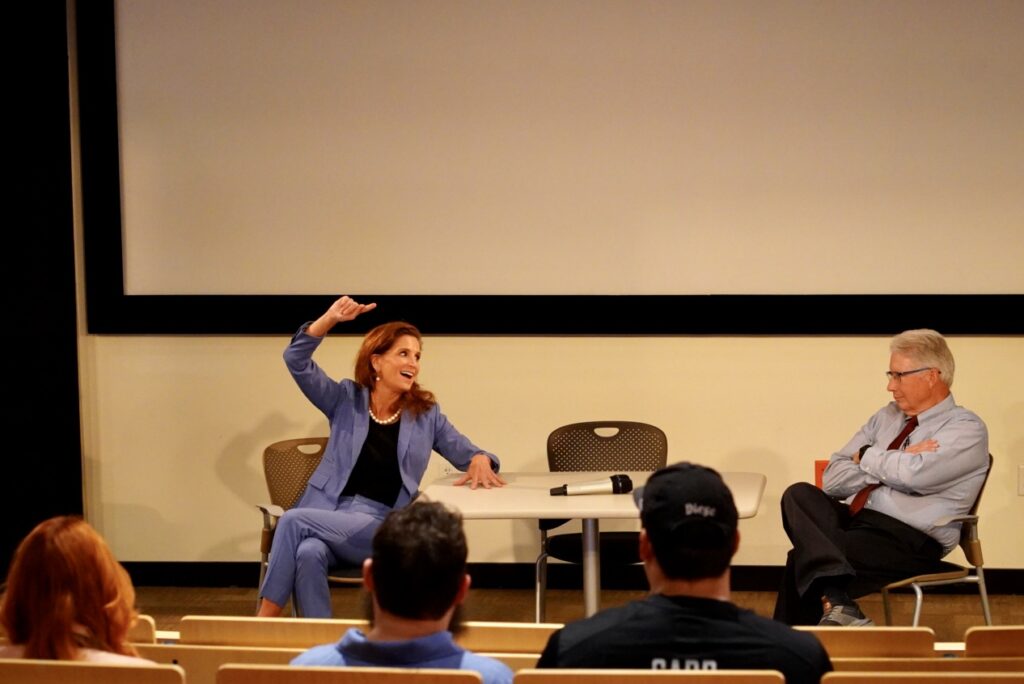
An acting assistant secretary for the U.S Department of State sat down for a roundtable discussion with UNLV students to highlight career opportunities in the foreign service and the safety of journalism.
Las Vegas was one of three stops Elizabeth Trudeau, with the Bureau of Global Affairs, made in her five-day trip on Sept. 8, according to the U.S Department of State.
Trudeau believes that diversity and equity has been a problem for over 200 years at the department. She is currently working with the Biden administration to address diversity and equality issues by reaching out to students at UNLV and similar institutions in hopes of bringing D.C. to their classroom.
“In the past, those who were able to work at the state department needed to be ‘pale, male, and yale,’ but that simply isn’t the case anymore,” said Trudeau. “That’s why we are visiting schools like UNLV in hopes to bridge the workforce gap.”
Journalism students and professors chimed in on the conversation with questions about how to repair the damaged relationship between the government and media industry.
During the talk, Trudeau also took some time to discuss the safety of journalists in the U.S.
“This event is terrifying for young journalists,” Trudeau said, referencing the recent slaying of Las Vegas Review-Journal investigative reporter Jeff German.
German was found outside the side of his house with several stabwounds, according to the Las Vegas Metropolitan Police Department in a press conference. The police have made an arrest of Robert Telles, who police believe is the lead suspect and a politician that German exposed.
“The threat to journalists is real and growing,” Trudeau said, “And events in Las Vegas are nearly comparable to incidents happening overseas to other journalists.”
Although German’s murder was comparable to incidents journalists overseas, he’s currently the only journalist murdered for their investigative work in the U.S. since 2007, according to multiple sources.
Globally the amount of journalists being killed is going up, according to Trudeau.
She also said that organizations like Reporters Without Borders and the Committee to Protect Journalists need to work together with government agencies to increase trust in reporting and protecting journalists.
In the wake of misinformation running rampant through the Russian-Ukrainian war, Trudeau referenced how journalists globally have to deal with the ramifications of this information being spread.

Mary Blankenship, a UNLV graduate student and Ukranian who specializes in Russian propaganda, states that its illegal for journalists to call events in Ukraine a war.
“You can go to jail for 15 years if you spread what the government terms as ‘fake news,’ what they consider an inaccurate description of calling the situation in Ukraine a war,” Blankenship stated in a past interview.
Trudeau closed the roundtable discussion by advising students to explore all of their opportunities and use their unique skills that come with being a journalism student.
“Journalism students are coveted in government agency spaces because they always have their antenna up,” said Trudeau. “They are well spoken, knowledgeable, and have unique transferable skills that other majors may not have.”
Prior to her work in the state department, Trudeau was a journalism student who worked in the field. After that, she worked in non-governmental roles, attaché roles and jumped to representing the foreign service in a larger capacity as the acting assistant secretary for the Bureau of Global Public Affairs.
As a part of Trudeau’s visiting tour, she plans to stop in Houston to meet with Fulbright alumni and engage in other university roundtable discussions with students.
